- Home
- Sonya Hartnett
Thursday's Child Page 2
Thursday's Child Read online
Page 2
‘Have to chop it down now,’ said Devon, considering the tree.
Marks from Tin’s fingers were preserved in the gunge: ‘Look!’ I said, impressed by the sight. ‘He did more digging than we did – he dug his own way out.’
‘He’s only a kid, Harper. How’s he going to dig himself out?’
Devon was scornful, so I didn’t bother explaining. We had hardly made a dent on our side of the mud, I knew; if any useful digging had been done, it had been done by Tin alone. Devon wouldn’t believe it, so I kept the knowledge to myself. We splashed through the water and ran to catch up with Da. He was off in the distance and I could see Tin’s small face with his chin on Da’s shoulder, staring back steadily at where he had been. I knew I wasn’t wrong, and Tin knew what he’d done, all right.
WHEN I LOOKED INTO Caffy’s frightful newborn face I thought, You’re the one Da would have exchanged for Tin. He would have put you in the mud instead. Not because Da had anything against Caffy but because Caffy had no meaning yet and because he had a good chance of dying shortly anyway, based on those that had gone before. It must be terrible, I thought, to be such a nothing that you could be bargained away. Tin was Da’s pet, of course, but it relieved me knowing he hadn’t offered to exchange Devon or Audrey or myself, either. We weren’t pets, but we weren’t nothing. Caffy was nothing. Da didn’t so much as glance at the baby until he’d got Tin washed and dressed and bundled in a quilt before the fire.
Mam was apparently battered but we were allowed in to see her by Mrs Murphy, who’d done the delivering, and Devon blurted out the story of the mudslide to her, giving himself a heroitude in the telling which he had not had in reality. Mam made Da fetch Tin and settle him beside her and if the baby thrived that would be the last time he’d be allowed to lie there, I suspected, though he’d slept all his life close to her heart. Thing about babies is, they take over everything, being louder than they are capable. Audrey grabbed me by the ear when Mam was distracted and dragged me wincing into the other room. She gave me a lash of abusing and finished off by snarling, ‘How could you let Tin get caught in a mudslide when you knew Mam was having a baby?’ and flipping me over the head with the flat of her hand. I wagged my tongue at her when she was back beyond the curtain and went and hunched in front of the fire to lick my wounds. Mrs Murphy was sitting there, goo-cooing at the baby. ‘You’ve got to be careful, Harper,’ she said to me. ‘You’re grown up now and responsible.’
I didn’t say anything, only seethed and rubbed my stinging pinched ear. If I could answer for mudslides, I would have made one slop over Audrey before another minute went by. She had a haughty streak of righteousness in her, she was as bad as someone religious. Mrs Murphy tried to console me by waving the baby under my nose and when I saw his skew-whiff head and face like a louse peering out from under an ash-heap I couldn’t restrain from opining that I’d never seen such a hideous and peculiar-looking coot in all my life and got cast into the paddocks with a whack from Mrs Murphy’s free hand. I went and sat cursing on the mullock heap where I’d stopped with Tin, before the day had turned sour on me. I could see the house the same as I’d seen it earlier and I was in no hurry to get back to it, just like before. The shanty didn’t look any different but now there was someone else living in it and it occurred to me, Where are we going to put him? While he was inside Mam’s stomach Caffy hadn’t taken up much more space than if it’d been Mam on her own, but now he was born he would need a cradle, or at least a box or drawer. The house only had the two rooms, and it was cramped already. Da would laugh and ask, What do you expect for nothing? And Mam would say, It wasn’t for nothing, Court. When I was young I never understood what she was talking about, because Da was right about the nothing.
Our shanty had been built by a prospector, who hadn’t needed space indoors: it was dirt that interested him, and there was plenty of that. All over the paddocks were mounds of the stuff that he had dug out and piled up and grass was growing on them now, they’d turned into land. Da had barriered the snaky old shaft but Devon and I knew how to get into it and we’d scratch at its walls in the darkness, searching for the dusky glimmer of gold. We never found anything and neither had the miner, he’d died empty-handed with only the echoing shaft and the slab-hut shanty to show for his efforts, and Da said the government boys would never have given us the land if there had been anything beneath it worth keeping for themselves. But Devon had great faith in that miner as having been unlucky rather than deluded and he used to pan the creek some days, and his fingers would freeze frigid blue. He was saving to buy a pony and because three years of doing so had rewarded him with only a scattering of black shillings, finding gold became the quicker way for him to get where he was going. He had never ridden a pony and we didn’t have a fence to pen one in but he had his plans and a name picked out already: Champion. Devon and that pony: you never saw anyone so demented.
If there was gold no one could see it, but there were trees with lacy leaves and the creek which dried up completely most summers and off over the horizon was ground that was all ours, tawny red ground the colour of a fox’s coat sprouting tussocks of grass that were not green but rather silver, which rustled like paper in the breeze and burned like tinder if you put a spark to it, and we had neighbours who had things the same. Most of the neighbours weren’t farmers and neither were our Mam and Da but the others were somehow more fortunate than us, more blessed than us our Mam said, and coaxed crops and vegetables to grow. We never could, and Da said our land must be particularly exhausted or maybe simply sullen, a bad patch maybe poisoned, so we trapped rabbits instead. There were plenty of rabbits around, the earth was bouncy with them. Da and Devon went trapping most days and Da would sit on the veranda for hours on warm evenings wiring snares as delicate as cobweb and near-invisible to the eye. Snaring was time-consuming but gave a pelt without a hole and missing the hole gave a pelt an advantage when there were rabbit hides galore for sale. We had racks standing beside the house and there were always a few flyblown skins pegged baking in the sun and the dogs knew better than to have a go at them. Once a month Da would hitch a lift on the rabbito’s cart and take his pelts into town and Devon would wash the racks while they were empty, the suds falling pink on the ground. The flesh from those flayed rabbits was stewed up by Mam and in bed at night I could feel it, stringy between my teeth.
I was almost seven, and accepted life as it came: I lived on exhausted land that was given to us by the government boys because of what my Da had done for his country during the war; in the war my Da got a bullet in the foot and the scar was gnarled like a tree-stump; my Da shot rabbits now, and my Mam made rabbit stew. My name was Harper Flute, and I was small for my age but I would grow; I had a gap where a tooth was still coming down and I could bend my thumbs backward until they touched my arm. I had chores to do each evening and five days of the week I went to school, where the Devil himself would get into me and my knuckles would be striped for his trouble. I had an older sister named Audrey and my brothers were Devon and Tin; there’d been a baby born today, and he was to be called Caffy.
I saw Da come out of the house and trudge along the path that led to where I was sitting and I tensed because I thought I might be in for another whacking, making it my third for the day, and sure enough he said to me, ‘Did you call that baby ugly?’
‘No, Da, I never did.’
‘Harper. Are you telling lies again?’
‘No, Da!’
He squinted at me. ‘That baby,’ he said. ‘He’s got a pointy head.’
I bit my lip and gazed at him.
‘He’s not near as bad as you were, though, the day that you were born. You were the scaringest thing I ever clapped eyes on. Face like a dropped pie.’
‘Da!’ I wriggled with delight.
‘It’s true, I tell you. Your Mam will have to pray about this new one same as she prayed about you. Please Lord, she’ll say, have mercy, don’t make us live with this gruesome sight forever … You’ll
see he’ll improve, chicken, when he gets over the surprise of being born. You getting a wet arse down there?
‘It’s not too bad if the grass is under you.’
He nodded; he sat beside me and we were side by side with our elbows on our knees. I said, ‘I didn’t mean to let Tin get caught in the mudslide. I told him not to go near the water, I told him it wasn’t safe. It was just an accident, Da. Audrey twisted my ear.’
‘Hurt?’
I nodded sombrely. Da wiped hair from his eyes.
‘She was wrong to do that to your ear. No one can do anything about mud. It’s one of those things that has a will of its own.’
I knew he was remembering being a soldier: Da said that in the war a whole country had changed into mud. The muddy country had suctioned down entire bodies of men and horses and no one saw a hair of them again. Da said that the soldiers would dig and dig frantically, spurred on by gargling screams, but the mud had a teasing nature and would suck its captive deeper just as the shovels were finding him, just as hands were reaching to clasp. The last thing the diggers would see might be a glimpse of face, a howling mouth suddenly silent or an eye rolling plaintively to them, the fight and disbelief gone at the end, quelled by grief and fear. A man in the mud was a condemned man, Da said, and arguing with his fate would only break your heart for you. I wondered if Da had thought about that country when he’d heard what had happened to Tin. He must have, I reckoned – I reckoned he was in this mood, this sunny joking carefree mood, because he believed he had argued with Fate for the right to Tin, and had won. He liked it, thinking he had done the rescuing himself, so I didn’t say anything about Tin scratching his own way free.
Da was right about Caffy: by the time a handful of months had passed the shape of his skull shifted until his head was as round as a ball of clay and just as soft to touch and he filled out his skin the way a child grows into a bigger brother’s clothing, the wrinkles all smoothing away. He looked like a newborn angel, with Da’s fair hair same as Audrey and Devon, with Mam’s blue gaze same as Tin and me, with lashes like fawn butterflies wafting over his eyes. He had a drawer of the dresser for a cradle but mostly he slept curled like a pup in the crook of Mam’s shoulder, his pink-lipped mouth making a circle around his dream. He was placid and cheery throughout the day but I fancied he was afraid of the dark: when he woke at night he would sob not with need or outrage but with a plaintive drag of misery, as one who has just heard the most harrowing news. This sad, sad weeping would wake all of us and I’d move nearer the warm light of the fireplace; Devon would pull his pillow over his head and, beside me, Audrey would heave a martyr’s sigh. Tin wouldn’t make a sound but I would see the glint of his eyes blinking in the glow coming off the embers. Da had built a small pallet for him and set it up at the foot of the bed I shared with Audrey, and sometimes when Tin was sleeping there his hands would flutter, seeking the old close comfort of his Mam. He used to sometimes study the baby, not touching or smiling or doing anything you could put a word to. He would watch Mam walking about the kitchen with Caffy gumming on her collarbone and he’d have that same vigilant, studious expression on him. It made Mrs Murphy decide he was nothing less than a seething mess of murderous jealousy and he should never be left alone with the baby. ‘Tin’s just looking,’ said I for him. ‘He isn’t doing any harm.’
That was backchat, and her eyes slid up and down. ‘Remind me of your age, missy.’
‘I’m seven, now.’
‘Seven, is it. I wish I were seven again. Life’s a simple thing, at seven. Ignorance, as they say, is bliss. Outside with you, my girl, where you ought to be.’
And then, one day, Caffy became ill. He started off in fine fettle but by evening he was arching his spine and loosing banshee shrieks of pain, slumping with exhaustion at the peak of each screech and heaving in air to screech anew. Mrs Murphy was summoned and gazed with delight upon him: sick infants were her reason for being, she thought there was nothing nicer and more pleasingly dreadful. She knit her brows and clamped her teeth and commanded us to stand aside. She pressed her hands to Caffy’s stomach and Caffy squealed blastingly. His face was scarlet as a plum and his fingers were clawed like a demon’s: ‘It’s colic,’ said Mrs Murphy. ‘A blind man could see it. I will have to stay.’
The weeks that followed were a morbid and mysterious time, full of whispering and tiptoeing and Mrs Murphy’s celtic prayers. She had her bags brought over and claimed Da’s side of the bed and bedroom, where she would always be close to the child; Da was banished into Devon’s bed and Devon was shunted to the veranda, though the nights could still be cool. Colic might last a week or a month or a fortnight or you could be laying out a body within a day or two, and there was no way of foretelling which way a baby would choose to go. ‘I’ve seen them bonny in the sunrise,’ said Mrs Murphy, ‘and cold as a whistle by noon.’ She told Devon and me to stay outside except in emergency, and to welcome every opportunity for being useful. Older brothers and sisters, she suggested, had saved the lives of infants in the past simply by being useful. I was ready and willing to make a heroine of myself and imagined the admiring tales that would be told of me, but my enthusiasm waned when I discovered that being useful meant carting buckets of water up from the creek so the baby could be soaked in them. I was only slight, not brawny, and the buckets were awkward and heavy to lug through the fields; Caffy would flail with his fever and every drop that splashed on the floor would give me a knife-like pang. Nothing anyone did seemed to make Caffy get any better so, in a poignant piece of usefulness, Devon and I found a picturesque site for his grave. His dying would be unfortunate because we’d become fond of him in the months we’d had him but at least Mrs Murphy would go home then, and we wouldn’t have to carry water or hear his squallering any more.
It was the wailing that was blamed, at first, for Tin carving out his hideaway beneath the shanty’s veranda. ‘What’s that child doing down there?’ asked Mrs Murphy, her head cocking like a sparrow’s
‘I think it’s quieter,’ said Audrey. She was sitting on the veranda’s edge where she came regularly to sigh.
‘He could go into the paddocks if he wanted quiet,’ I pointed out. ‘Anyway, he can hear the baby through the floor, probably. That’s not why he’s there.’
‘Why, then, Harper, if you’re so clever?’
We could see the bright shine of Tin’s eyes peeking out at us. He’d crept under the veranda three days earlier and scooped from the earth a shallow which contained him agreeably. If you reached under the veranda you could touch the tip of his nose. If you put an eye to a chink in the boards and squinted, and if the light was falling right and the moment was a lucky one, you could make out the silk of his hair. ‘He just likes it, that’s all.’
‘But what is he doing? He must be doing something.’
‘He’s doing nothing. He just lies there and watches.’
‘Watches what? And why’s he watching it?’
‘For no reason, he’s watching nothing. He comes up for bedtime and his tea.’
Mrs Murphy looked withering. ‘Well, at least he’s keeping out of the way.’
No one but me took any notice of Tin during the next few days, because Caffy was at his worst – Devon scouted for a gravestone. Da took the slug gun and a crib of johnnycake and went out for rabbits each morning, his face white and haunting. Audrey stayed inside with Mam and Mrs Murphy and the three of them hovered above Caffy’s drawer as though frowning at him might frighten the illness away. After school and between fetching water I passed the time with my hands pressed against the walls of the house, talking through the shadows to Tin. Sometimes he would stop his work and listen; sometimes the job of improving and extending his lodgings was of vital concern and puffs of dirt would fling out while I spoke to him, and go drifting down my throat.
‘You liked it, didn’t you, Tin? Yep, you liked it, that dark. Da came running and so did Devon and I was running too, we were thinking you’d been killed under all that muc
k and by rights you should have been but you weren’t, you weren’t even frightened. You liked it, you thought it was fine. You didn’t want to come out but you knew you were breaking your poor Da’s heart so you took pity, and started digging. And you liked the digging, didn’t you, even better than you liked the dark. You liked the feel of that dirt on your paws … Tin?’
Sometimes he’d listen; sometimes I’d hear the scraping of his nails.
‘Tin. You’re only small, you’re only a boy and not much use for anything, but I know something about you. You like the dark and you can dig. You can do it good and well. Audrey shouted at me when the mudslide squashed you, but I didn’t mind. She’s always shouting, so it made no difference to me … What are you doing, Tin? Where are you going?’
I’d be very still when I spoke to him, like you must be still around a bird if you want a look at it. You couldn’t see him now if you crouched at the edge of the veranda – he’d gone much further beneath the house. The shanty was built on a slope and the stumps under the veranda were tall, tall enough to let a chicken pass with just a ruffling of feathers on her crown; at the rear of the house the stumps were much shrunken, and a cat needed to crawl to get by. Tin was digging round abouts in the pitch-black centre now, grubbing out a bowl of earth that was deep enough to stop him bumping his head on the underside of the floor but shallow enough to keep him warm and secure. At sunrise he would begin his excavations, the sight of his bare feet slipping away the last you would see of him until twilight.
And then, one evening and suddenly, Caffy was better. The redness soothed away from him as if someone had pulled a plug. Da had swapped his cigarettes for a bottle of medicinal brandy and there was enough left of it for him and Mam and Mrs Murphy to fill the three best glasses, and we children were given water flavoured by an orange. We sat on the veranda and the sunset stained Caffy’s cheeks pink as he dozed in Audrey’s lap, a thinner infant now with that scrubbed and bewildered expression that a fever leaves behind. Talk, which had been for so long about the baby, finally found its way onto Tin.

 Butterfly
Butterfly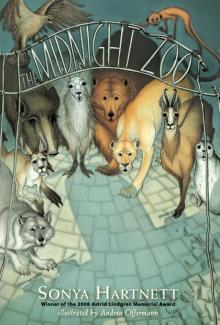 The Midnight Zoo
The Midnight Zoo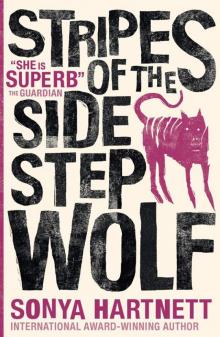 Stripes of the Sidestep Wolf
Stripes of the Sidestep Wolf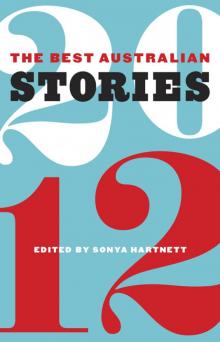 The Best Australian Stories 2012
The Best Australian Stories 2012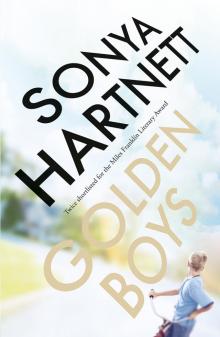 Golden Boys
Golden Boys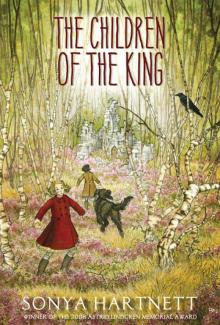 The Children of the King
The Children of the King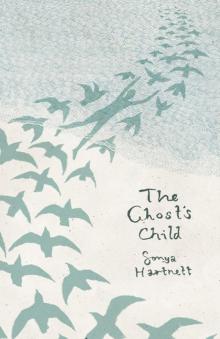 The Ghost's Child
The Ghost's Child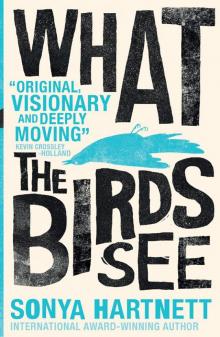 What the Birds See
What the Birds See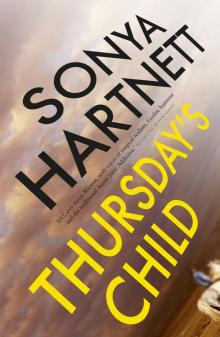 Thursday's Child
Thursday's Child